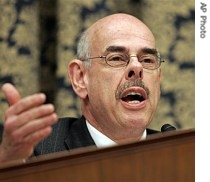2007年VOA标准英语-Ex-White House Aide Denies Distorting Climate R(在线收听)
Washington
19 March 2007
The former chief of staff of the White House environmental policy office has denied charges that he sought to politicize government reports on the causes and effects of global warming. VOA's Dan Robinson reports from Capitol Hill Philip Cooney defended himself before a congressional committee.
As chief of staff of the White House Council on Environmental Quality until 2005, Philip Cooney is a central figure in the continuing debate involving allegations by some government climate scientists that the Bush administration tried to suppress findings supporting global warming.
Monday's session of the House oversight and government reform committee marked the first appearance by Cooney, who before his White House role worked for 15 years for the American Petroleum Institute, which represents the interests of oil companies.
 |
| House Oversight and Government Reform Committee Chairman Representative Henry Waxman |
Waxman says changes Cooney made to government reports were aimed at injecting doubt into the national discussion about the dangers of global warming. "It would be a serious abuse if senior White House officials deliberately tried to defuse calls for action by ensuring that the public heard a distorted message about the risks of climate change," he said.
Cooney asserts that changes he made to a 2003 government strategic plan for climate change, and changes to other reports, were part of "routine and well-established" inter-agency process of providing input.
All of the changes, he says, were in line with findings in a report by the National Academy of Sciences, and reflected both certainties and uncertainties about climate change.
"The comments and recommendations that I offered in reviewing executive branch policy documents on climate change were consistent with the views and exploration of scientific knowledge that many others in all three branches of our government were undertaking," he said.
At the witness table with Cooney was a government scientist who has accused Cooney and the Bush of trying to minimize scientific findings on global warming.
James Hansen, Director of NASA's Goddard Institute for Space Studies, says the editing of government reports was part of an overall effort to play down links between greenhouse gas emissions and planetary warming. "The nature of these edits is a good part of the reason for why there is a substantial gap between the understanding of global warming by the relevant scientific community and the knowledge of the public and policy makers, because there has been so much doubt cast on our understanding that they think it is still completely up in the air," he said.
Hansen also alleges that the Bush administration used budget cuts in certain programs to hamper climate change research, and used political appointees in public affairs positions at NASA and elsewhere to squelch opposing views. "When you tell scientists that they can't speak, [that] they have got to hang up on a reporter, and report this [to agency officials], and allow the right of first refusal, that someone else can speak for you, it doesn't ring true, it is not the American way, and it is not constitutional," he said.
Cooney was defended by the current chairman of the White House Office of Environmental Quality, James Connaughton. "The committee's focus on my former chief of staff, Mr. Philip Cooney, is misguided, and actually I find it a little bit ironic. It was Mr. Cooney who was responsible for inviting Dr. James Hansen to the White House in 2003 to brief me and other senior officials on advances in climate change science. It was a remarkable and important presentation," he said.
Republicans challenged Hansen's contention that he had a right to speak out on global warming issues without being vetted by agency officials. Republican Congressman Darrell Issa renews a longstanding assertion that allegations against the administration are motivated, in part, by politics. "I am concerned that many scientists are increasingly engaging in political advocacy, and that some issues of science have becomes increasingly partisan, as some politicians sense that there is a political gain to be found on issues like stem cell[s], teaching evolution, and climate change," he said.
Republican Chris Shays says he believes the Bush administration missed an opportunity on the climate change issue. "I weep that this administration did not seize this issue and claim it as its own, and this issue being climate change is for real and mankind has had an impact," he said.
One of the documents discussed in Monday's hearing is a memo from the White House Council on Environmental Quality to the office of Vice President Dick Cheney. Although portions of it were provided to committee staff and read at the hearing, Congressman Waxman is demanding that the White House turn over the actual document, which he asserts shows "active coordination" among White House officials to inject uncertainty into discussions of climate science.
Global warming will be in the spotlight again on Capitol Hill this week when former U.S. vice president Al Gore appears before House and Senate committees.
The hearings will focus on Gore's Oscar-winning film about his efforts to raise awareness about global warming, as well as the recent report by the United Nations Intergovernmental Panel on Climate Change, which said human activities are likely to be causing warming of the earth.